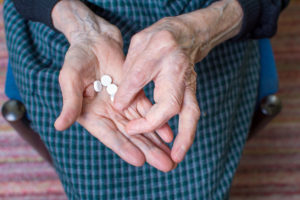April 15, 2017
 Is it possible you may have a preconceived notion of certain stereotypical groups of people? For example, what comes to mind when you hear the words “drug addict”? A young adult struggling to get through everyday life without a fix, possibly resorting to a life of crime to fund his or her habit?
Is it possible you may have a preconceived notion of certain stereotypical groups of people? For example, what comes to mind when you hear the words “drug addict”? A young adult struggling to get through everyday life without a fix, possibly resorting to a life of crime to fund his or her habit?
If that’s so, you may be surprised to learn that older adults are breaking the mold, unintentionally experiencing serious elderly addiction problems – namely, to opioids. Often prescribed for short-term pain relief, longer term use of the drugs can result in addiction. However, the American Geriatric Society updated its guidelines in 2009 to strongly recommend their use in seniors, who, they reasoned, are less likely to become addicted.
“There’s no factual, scientific basis for that.” Dr. Mel Pohl, of the Las Vegas Recovery Center says. “The drug takes over in the brain. It doesn’t matter how old the brain is,” he explains.
As many as 15% of patients are receiving an opioid prescription when leaving the hospital, and almost half of them are still taking that medication 3 months later. The potential to become addicted at that point is alarming. Opioids themselves might leave seniors lethargic, groggy, and depressed, and the effects of stopping the medicine once dependent could be even worse: queasiness, sweating, muscle aches, and more.
So what’s a better solution? Supplying yourself with knowledge and asking about safer alternatives to opioids for your older loved ones to avoid the possibility of elderly addiction is a great place to start. However, remember the fact that even over-the-counter pain medications might be hazardous for older people, making it challenging for physicians to know the best way to control senior pain – managing dangers with the need to remove suffering in elderly patients.
It is very important for all of us, regardless of age, to become familiar with each of our conditions and treatment options, and make smart decisions in our care – and, to take prescription drugs exactly as prescribed by doctors, for the length of time they are prescribed.
Continuum’s in home care in St Louis, MO can assist older persons in many ways to help avoid elderly addiction. We are able to provide transportation and accompaniment to doctors’ appointments and procedures, pick up prescription medications, and provide medication reminders to make sure older adults are on track with appropriate medication management. Contact us any time at (314) 863-9912 or (636) 861-3336 to find out more ways we can help keep your senior loved one safe and well, right at home.
